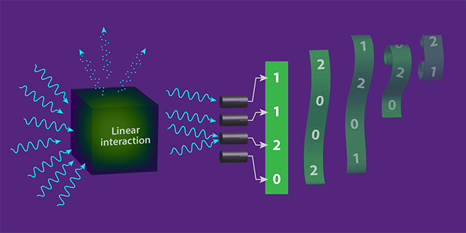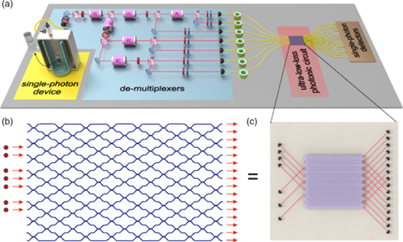Professor PAN Jianwei and Professor LU Chaoyang of the University of Science and Technology of China (USTC) carry out an experiment on boson sampling with photon loss in collaboration with Researcher YOU Lixing’s group of Shanghai Institute of Microsystem and Information Technology (SIMIT) of Chinese Academy of Sciences (CAS). The results show that boson sampling with a few photons lost can increase the sampling rate, which brings a demonstration of quantum supremacy closer to reality. This research is published in Physical Review Letters on June 6th as one of Editor’s Suggestions. The American Physical Society website Physics comments on the paper with a Viewpoint article entitled “Lost Photons Won’t Derail Quantum Sampling”.

A boson-sampling device with photons / Image from Physics
Boson sampling with photons is considered as a strong candidate to demonstrate quantum computational supremacy. However, the unavoidable photon loss in the photonic experiments is a major obstacle to scaling up. PAN and colleagues’ work is the first to confirm experimentally that even as photons leak from the system, boson sampling with photons still produces useful output. This means that researchers don’t have to “toss away” the output of a sampling experiment when photons are lost, allowing for exponentially faster sampling rate. The experiment is based on a world-class single-photon source from a quantum-dot micropillar developed by the research team and high-performance superconducting nanowire single-photon detectors (SNSPD) developed by SIMIT. This research suggests that our country is leading the charge internationally in the field of quantum computation and takes yet another step forward for the demonstration of quantum supremacy.

Experimental setup for lossy boson sampling / Image from Physical Review Letters
This work was supported by the National Natural Science Foundation of China, the Chinese Academy of Science, the Science and Technology Commission of Shanghai Municipality, the National Fundamental Research Program, the State of Bavaria, and the U.S. National Science Foundation.
References:
Toward scalable boson sampling with photon loss. Physical Review Letters 120.23 (2018): 230502.
https://journals.aps.org/prl/abstract/10.1103/PhysRevLett.120.230502
Viewpoint: Lost Photons Won’t Derail Quantum Sampling
https://physics.aps.org/articles/v11/57
(Written by YANG Ziyi, Edited by WU Qiran, USTC News Center)